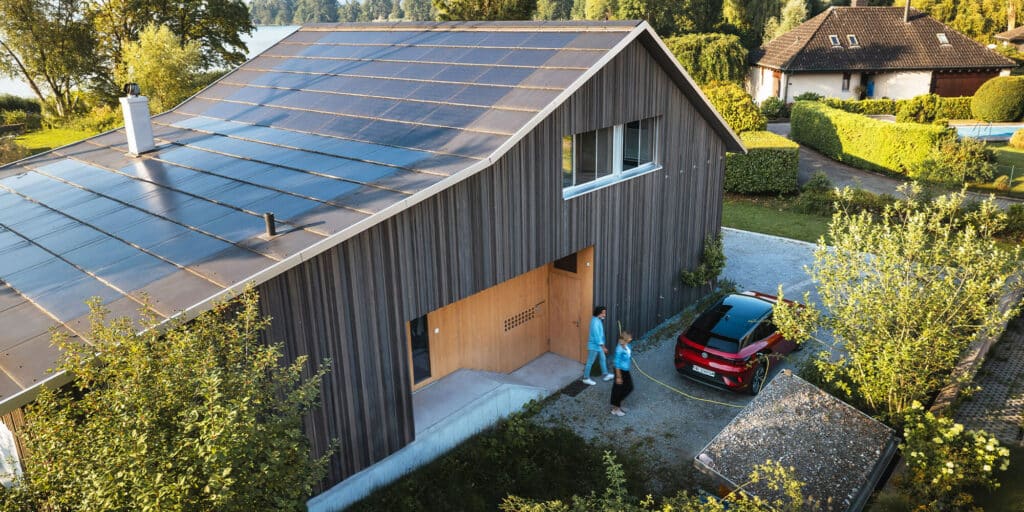
Switching to an electric car fleet is one of the best ways to reduce in-house emissions and make your business more energy efficient. But for SMEs, electromobility solutions for businesses don’t seem to be worth it at first glance – in Switzerland, there is still no right to charge, i.e. the option for a tenant to force the landlord to install a charging station. What’s more, the Swiss Federal Council abolished the four per cent tax exemption for electric cars at the beginning of the year.
SMEs are only indirectly affected
Unlike large companies, SMEs in Switzerland are not affected by the new implementing ordinance on climate disclosures. For instance, large Swiss companies have been required to publish a climate report since 1 January 2024. These include public corporations, banks and insurance companies with at least 500 employees and total assets of at least CHF 20 million or a turnover of more than CHF 40 million. SMEs therefore fall outside the scope of the ordinance, although they should nevertheless consider publishing a sustainability report. That’s because, for the purpose of their climate reporting, larger companies will increasingly demand evidence from their partner companies and suppliers as part of their Scope 3 reporting. The same applies to SMEs heavily geared towards the EU and businesses that supply to the EU.
In addition, the Swiss Federal Council intends to draw up a bill by next summer, proposing that Swiss regulation be EU-compatible. It’s already clear that, as in the EU, even companies with 250 employees will be affected by sustainability reporting in future. In concrete terms, this means that companies – whether directly or indirectly affected – need to get more used to measuring and reporting their greenhouse gas emissions and also define measures to achieve carbon neutrality by 2050. The stricter rules will have an impact on the whole business environment, including SMEs.

Renewable mobility means more sustainable mobility
Electromobility is already much more sustainable than combustion technology; according to TCS, an electric car matches the carbon footprint of a car with a combustion engine after just under 50,000 kilometres. Switching to an electric fleet is therefore one of the best ways to reduce in-house emissions. That’s because electric cars emit less, or even no direct CO2, especially when they are charged using renewable energies such as solar power. In Switzerland, 75 per cent of electricity comes from renewable sources, and the trend is rising.
This blog post on “Technology and Renewable Energies” by Hans Fischer, a long-time expert on technology and renewable energies for electric cars, provides more information on this topic.
Here’s one example: A diesel-powered C-Class Saloon emits almost 50,000 tonnes of CO2 over its lifetime. In a company with 375 employees, this would mean 18,750,000 tonnes of CO2 emitted over the fleet’s lifetime. By way of comparison, a fleet of 375 electric saloons charged using conventional electricity emits around 6.5 million tonnes of CO2 over its lifetime.
If the fleet were to be charged only using electricity from renewable sources, CO2 emissions would be reduced by another 4.5 million tonnes to just over two million tonnes. Furthermore, an electric fleet not only reduces in-house CO2 emissions, it also helps in the fight against climate change.
How your business can adopt a flexible approach to overcoming hurdles
Despite the high potential, there are still reasons that may prevent a business or SME from switching to an electric fleet. The import tax on electric cars is causing uncertainty in the market this year, while last winter it was the impending power shortage. Other factors that can act as barriers to fleet electrification include the cost of purchasing the charging infrastructure and the question of whether it is possible to charge once a day without any stress. These uncertainties call for bespoke solutions and adequate flexibility. There are already flexible e-mobility solutions for SMEs, which ensure better predictability and control of costs to make the switch to an electric fleet economically viable.
Here’s one example: Aarau-based technology company Itsense switched to Clyde e-mobility in January 2024. This SME was particularly impressed by the fact that the cost of the new electric company car is billed monthly at a fixed subscription rate that even includes electricity, making budgeting easy.

After deciding we wanted a car subscription, we selected and ordered a suitable model. The whole process was efficient, easy and straightforward – from booking the Audi Q4 50 e-tron quattro right through to its delivery.
Silvan Grüter | CTO bei Itsense
Since then, he has mostly used the electric car to visit customers, although it is also available for other employees to use. “We’re based right next to Aarau railway station, so we have excellent public transport links. But sometimes, we need to act quickly or get to a customer who isn’t so easy to reach by public transport”, he adds.
As a local company with an international customer base, it was important for this SME to operate sustainably and further reduce its carbon footprint. But the switch to the electric car also brought challenges. Silvan Grüter has realised that he now has to plan ahead when it comes to charging. “Even though you can find a charging station practically anywhere, you still need to schedule the charging times”, he emphasises. “Thankfully, this is only an issue in the case of longer, spur-of-the-moment journeys.”
Most of my journeys are short or medium distances, so the battery usually has plenty of charge.
Silvan Grüter | CTO bei Itsense
Why a Clyde electric car fleet is the ideal solution for your business
Why should you choose an electric car fleet on subscription rather than leasing electric company cars?

Short delivery time
Do you have greater needs at certain times of year? Or are you just looking for a stopgap while you wait for your new car to arrive? Our electric car will be on your doorstep in just 10 working days.

Transparent subscription model
An electric car for a trial period, as an alternative to leasing or simply for testing? We offer subscriptions starting from three months – including cost transparency to make budgeting much easier for you.

Flexible mileage
Pool vehicles for high visibility? Expats out and about working on short-term projects? Thanks to adjustable monthly mileage packages, you can stay as flexible as you need to be.

Attractive benefits
Employees with a Clyde car subscription get CHF 50 off the monthly rate – as a thank you for their contribution to the energy and mobility revolution.
Ready to electrify your company fleet? Then let’s get started!
The text is based on thisarticlefrom KMU-Magazin No. 3, March 2024
Clyde electric car fleet for your business
Sustainable. Flexible. All-inclusive. With Switzerland’s most sustainable electric car subscription from Clyde, you can minimise your carbon footprint while enjoying maximum flexibility on the road. And in contrast to leasing, with us everything is included – even electricity. Never before has e-mobility been so affordable, easy and risk-free. Now for individual employees or as a fleet for the whole business with exclusive discounts. Look forward to sustainable mobility for your business.


